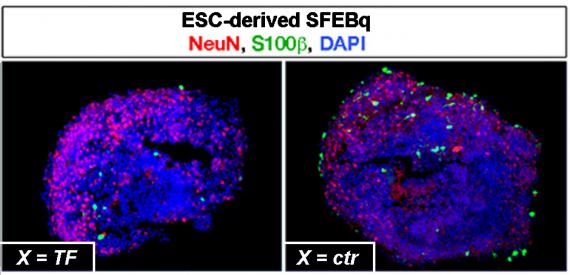Astrocytes play a large variety of roles in cortico-cerebral development, physiology and pathology. They shape the morphology of neuronal dendrites and assist migration of some neuronal progenitors. They contribute to genesis and function of the blood-brain barrier, provide structural and metabolic support to neurons and modulate synaptic transmission and information processing. They react to pathological conditions upregulating specific gene products and demarcate the damaged site from surrounding tissue with a scar, poorly permissive for axonal regeneration.

Cortico-cerebral astrogenesis takes place from autochthonous precursors, following neurono-genesis and prior to the main oligodendrogenic wave. Molecular mechanisms controlling its spatio-temporal articulation arestill largely obscure. We are interested in these mechanisms, with special emphasis on commitment of tripotent neural stem cells to astrogenic fates and fine tuning of proliferation/differentiation kinetics of astrocyte committed progenitors.

We are investigating these mechanisms in mice and humans, taking advantage of a variety of complementary model systems. These include mouse mutants, in vivo electroporated mouse brains, iPSC-derived human brain tissue, murineand human astrogenic cultures engineered by lentiviral vectors and TetON technology.
 We are confident that, beyond comprehension of normal brain mophogenesis, results of these investigations will be of substantial help for rationale management of a variety of pathologies, such as stroke, cancer and neurodegeneration.
We are confident that, beyond comprehension of normal brain mophogenesis, results of these investigations will be of substantial help for rationale management of a variety of pathologies, such as stroke, cancer and neurodegeneration.

